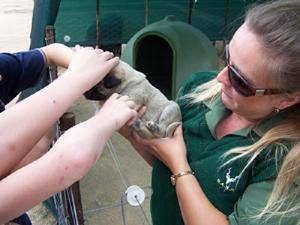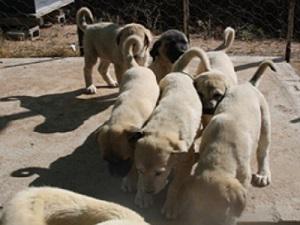Paul Van Helden
Other projects
The project aims to breed and train Anatolian dogs for livestock farmers who cannot afford to pay for the dogs. The Namaqua National Park’s Anatolian Shepherd dog breeding project is the first project of its kind for SA national parks.

Each year, farmers lose livestock to predators and in retaliation wildlife is killed. Farmers set traps for jackal and caracal, but based on skulls found at traps, at least 80% of animals caught are non-target species. Stock loss is the main cause of income losses. A single animal lost can be 25% of the farmer’s monthly income. In order to limit this two component loss, we have initiated a project to introduce dogs as livestock guardians. The Anatolian Shepherd Dog originates from Turkey, and were used to guard flocks, and still have that protective, guarding instinct. However, unlike the other dogs that local farmers use, they are not hunters so do not kill wildlife. Farmers target jackals and caracals but other species such as leopard, aardwolf, genet, foxes, honey badgers, aardvark, small cat species, many mongoose species and even tortoises are killed. There is a big difference between the numbers of these animals found inside the park and outside it, which illustrates the negative impact of humans on wildlife.

The project aims to supply Anatolian dogs to livestock farmers, 60% of whom are indigenous people. They are mostly on areas which are under ecological stress. Owing to job losses (mine closures) in the area, more people are trying to farm- but the land area is the same and carrying capacity is extremely limited. The dogs will contribute to income for the owner by reducing losses. Trial results show that people losing 30-40 sheep a year reduce losses to 1-5 when they have a dog. There is thus less incentive to poach wildlife. From a conservation perspective, small mammals on private land have an improved chance of survival. This is good for the genetics of the park wildlife (the park will not be an island). Finally, fewer small mammals entering and leaving the park will be killed by traps and overall the Succulent Karoo biodiversity hotspot benefits. The Park has initiated its own breeding programme and currently has four breeding pairs that are used for breeding. This project helps to sustain the breeding programme and ensure that the Anatolian dogs become a favoured route to predator control and farm conservation and thereby benefit all parties.